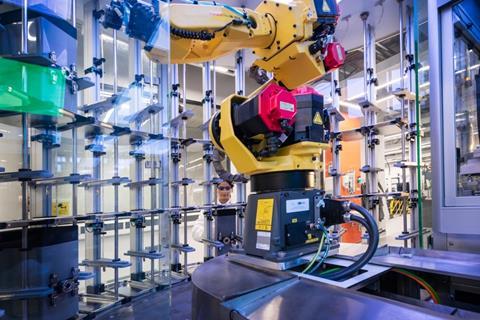
The University of Liverpool has unveiled plans to build a £100 million artificial intelligence (AI)-driven materials discovery centre by 2031.
Located in Liverpool’s Knowledge Quarter, it is hoped that the new AI Materials Hub for Innovation (Aim-Hi) will be a flagship national facility dedicated to accelerating the application of AI in materials chemistry.
It is estimated that the purpose-built 9350m2 facility, featuring ‘flexible and adaptable laboratory space’ and an ‘innovation incubator’, will create or support up to 900 jobs across the UK and generate more than £400 million.
‘If you look at the challenges we have today, society is going to need materials to tackle them,’ explains Matthew Rosseinsky, an inorganic chemist at the University of Liverpool. ‘That’s going to involve chemistry – and we want to seize the opportunity that AI offers to tackle that challenge better, tackle it faster and, at a very high level, that’s what the aim is of Aim-Hi.’
‘AI offers a new set of tools, and what we need to do is develop and deploy exactly the right tools to help chemists, physicists [and] materials scientists make those breakthroughs in discovering and optimising the materials that we will need.’
Aim-Hi will build on the success of the University of Liverpool’s Materials Innovation Factory, an £81 million centre opened in 2018 in collaboration with Unilever, which has generated more than £120 million in competitive grant funding.
‘We’re talking about an even bigger ambition than the Materials Innovation Factory,’ says Rosseinsky. ‘To realise that, we’re going to need a larger scale of partnership, and that’s going to be industrial partnership and also, very importantly, academic partnership within the UK.’
‘The focus of Aim-Hi is creating a centre of excellence here, but it’s not a centre of excellence that’s going to be in a vacuum, it’s going to have to succeed through partnership,’ he adds. ‘There’s a large skills agenda that needs to be addressed, to bring people in right across the range of skills and jobs that are going to be created as we develop these new scientific capabilities.’
Over the past couple of years there has been significant scepticism, as well as excitement, over the use of AI for materials discovery, with some experts warning of the dangers of hype in the field.
However, Rosseinsky says it is important to remember that ‘chemistry is not a subset of AI’. ‘The idea that simply because AI exists, does not mean it will have a transformative impact on chemistry,’ he says. ‘But there’s already exciting evidence that it will have a very large impact on chemistry – I’m talking about AI in terms of computer algorithms, but also physically embodied AI in terms of robotics; there’s already evidence that that’s going to be extremely impactful – for example, fully autonomous workflows for discovering new product formulations, new catalyst systems from insightful combination of components – that’s already demonstrated.’
He says the opportunity comes down to two things – the vast size of chemical space and the opportunity that AI offers chemists to tackle that problem. ‘But there’s a very important thing to bear in mind, that the AI, in and of itself, will struggle with that challenge of finding new chemistry – it’s extremely good at interpolating within the chemistry that we have – [but] it’s through working collaboratively with human, expert researchers that AI tools will enable us to do that key extrapolative task and find the new and distinctive materials we need in the future.’
He says there is already evidence that AI is helping us do things we couldn’t do before but it remains to be proven how these capabilities are going to make a difference in terms of the materials we can access and the technologies we can build from them.
‘That’s why we need to put a lot of energy into answering it,’ he adds. ‘To be really candid, if we don’t answer that question in the UK, other people will answer it, and they will reap the benefits more rapidly than we do.’

















No comments yet